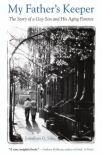My Father's Keeper: The Story of a Gay Son and His Aging Parents, Jonathan Silin [uplifting novels .TXT] 📗

- Author: Jonathan Silin
Book online «My Father's Keeper: The Story of a Gay Son and His Aging Parents, Jonathan Silin [uplifting novels .TXT] 📗». Author Jonathan Silin
ginning. However my parents understand their family’s special tal-ents, they are now endangered because there may be no grandchil-dren, at least from this son. They are caught up in a set of narrow, dare I say narcissistic, ideas about how one generation lives through and influences another. In the end, there are no questions about intimacy, love, and the gay world in which I live: No curiosity about what being gay means to me, only statements about what it means to them.
It is at about this time, 1978, that I go to see Dr. M for the last time.
In 1963 he had opened a door just wide enough for me to peer into a space where my father and my infant self could be seen in mutual rap-ture. Back then actually entering such a room felt intolerably threatening. Only fourteen years later do I feel secure enough to visit Dr. M, now ostensibly for professional advice.
We meet at Dr. M’s office in the highly respected therapeutic nursery school that he helped to found. Having spent ten years teaching young children, I want to refocus my career, and Dr. M, a colleague of Anna Freud, seems an appropriate person with whom to discuss possible study at her clinic in London. In retrospect, the answer to my specific question—how will my application as an openly gay man be received?—is obvious. Even then, nearly ten years after Stonewall, my professional pride is loath to accept exclusion from what my educator colleagues judge to be the seat of therapeutic knowledge. My very presence in Dr. M’s office is paradoxical. I am eager to proclaim my mental health and seek approval from someone whose earlier remarks, at best, were a clinical error in judgment and, at worst, left me deeply disturbed.
My question makes the usually confident Dr. M uncomfortable.
Perhaps it is that I have forced him to articulate the popular clichés and biases that have dominated the psychoanalytic world until recently and announce a professional judgment on my life that causes him difficulty. I would like to think that Dr. M had not succumbed to the worst excesses of analytic thought and had approved of the 1973
American Psychological Association decision to excise homosexuality from its official list of psychiatric disorders.
138 n jonathan g. silin
I cannot know where Dr. M himself stands on the subject of homosexuality. He doesn’t say, and the silence following my question is long and palpable. When he does respond, his words are smooth and skillfully crafted: “I think you might be more comfortable elsewhere.
There are many places to train that would be more receptive to your application”—but the emotions are less polished and more jagged.
Now it is I who have opened the door and Dr. M who has firmly closed it. I have the answer to my question as well as his pronouncement on my suitability to serve among the analytic elite. I leave feeling strangely content.
Ironically, when I turn to one of the few openly gay psychiatrists of that era to continue the conversation cut short in Dr. M’s office, I once again encounter my father. In our very first session, this psychiatrist confides the he grew up in the same small city in western Pennsylvania as my father and remembers him well. He proceeds to ask after my father’s five siblings by name, cannily characterizing each one with the briefest comments. I find no comfort in this familiarity, with this blurred, dare I say contaminated, fault line. Much to the doctor’s consternation, I terminate the relationship immediately after solving my professional quandaries.
During these and succeeding years Bob and I attend the requisite family functions at the same time as I manage to sustain a necessary emotional space between my parents and myself. Then, with their first hospitalizations in the mid-1990s, it is no longer possible to do this. Perhaps the vulnerable body is what puts the emotional issues in perspective. Shockingly at first, all modesty falls by the wayside as well. Detailed reports about food consumed and left untouched on the tray, body fluids collected and resisting collection, weight gained and lost, preoccupy us all. I know more than I want to know about their bodily functions, just as I am forced to learn my way around their Byzantine financial arrangements. I struggle to master the multiple bank accounts, insurance polices, and safety deposit boxes that make it all but impossible to grasp the real limits of their resources. Attempting to keep track of the household expenses, I discover the daily m y fat h e r ’ s k e e p e r n 139
economies my mother makes to secret away small amounts of money
—the refusal to buy in quantity for fear they will not live to use the products, the stacks of outdated newspaper coupons promising fifty cents off three cans of soup, the down-to-the-penny reports she extracts from whoever does the shopping. All this laying bare of the practical arrangements by which they stitch together their lives is poignant and painful. I do what is required, knowing that, in the interest of preserving a modicum of my parents’ dignity, some mysteries are better preserved than unearthed. Whether it is simply the passage of time, the years of therapy, or learning to write through my experience, none of my newly acquired insights is as threatening as





Comments (0)